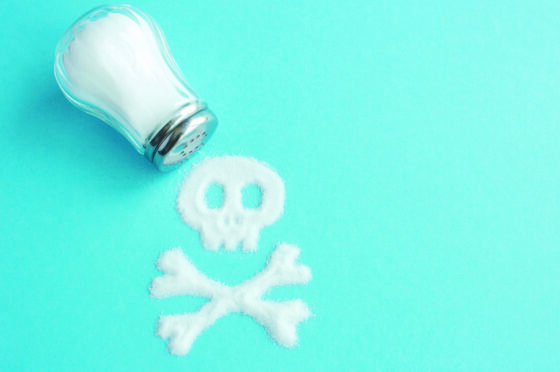
Fond of salty snacks? Always sprinkling salt on your dinner?
Like many people, you could be consuming too much sodium – the dietary mineral found in salt – and experts are worried about the impact it’s having on our health.
The British Heart Foundation is calling for urgent action, saying people are consuming “far higher levels of salt than they realise”. The charity believes introducing a levy to curb the salt content in food could potentially save lives.
“Excess sodium intake is extremely common across the world,” agrees Dr Jay Shah, cardiologist and Chief Medical Officer at Aktiia, who make 24/7 wearable blood pressure monitors. “The average intake of sodium is about double the recommended amount.”
It’s true we need some salt. But, according to the NHS, adults should consume no more than 6g of salt per day (2.4g of sodium), which is about one teaspoon. Part of the problem, though, is that many foods we buy already contain lots of “hidden” salt, particularly processed foods like bread, sauces, soups, cereals and bacon or ham.
Here are just some of the reason to cut down on your salt intake:
Water retention
Ever feel puffy or more bloated after salty meals? These things are often linked with water retention – and salt can be a factor here, as sodium plays an important role in how we regulate fluid levels in the body.
High blood pressure
This isn’t just about puffiness, though. It’s also a major factor in high blood pressure, heart disease and stroke – a leading cause of death and serious disability in the UK. According to experts, some 80% of strokes could be prevented, largely by addressing high blood pressure – and reducing salt intake is key.
As Dr Shah says: “High salt intake is one of the causes of high blood pressure, which is the most common reversible risk factor for cardiovascular death and disease.”
Victoria Taylor, senior dietician at the British Heart Foundation, explains: “We need some salt in our diet, but if we eat too much salt it’s linked to raised blood pressure. This is because the sodium in salt makes our bodies hold onto water and the more water in our blood vessels, the higher our blood pressure gets. High blood pressure can put you at risk of developing heart and circulatory diseases.”
It’s important to note that high blood pressure usually doesn’t cause noticeable symptoms, which is why getting it checked regularly is so important. Keeping salt intake to a suitable level can help, but some people require medication to help manage high blood pressure too.
Stomach cancer
Stomach cancer is the fifth most common cancer in the world (although it’s considerably less common in the UK), and a diet high in salt has been associated with the disease.
According to World Cancer Research Fund International, the stomach lining “may develop lesions if too much salt is consumed, which can eventually lead to enough damage to cause cancer to develop”. It’s believed a crucial element here is how salt influences H.pylori, a bacterial infection that can damage the stomach and is associated with a higher risk of stomach cancer. High salt intake has been found to worsen these effects.
Osteoporosis
A number of things are recognised as risk factors for osteoporosis, a condition that causes bones to become thinner and weaker – such as hormone changes in menopause, certain other conditions and medications and nutritional deficiencies. Too much salt may also have an impact on bone health.
According to World Action On Salt, Sugar and Health, high salt intake may increase urinary excretion of calcium – and calcium is vital for healthy bones. Research suggests this is particularly important during adolescence, a vital time for developing strong bones.
What can you do about it?
“The majority of salt in our food is there before we buy it,” says Taylor. “This means we end up consuming more than we realise. Cutting down on salt in our diets is an important way we can help keep our blood pressure under control and reduce our risk of a heart attack or stroke.”
This means thinking twice before adding salt to meals, and getting in the habit of checking salt/sodium contents on food labels.
“To keep your heart healthy, focus on eating more fruit, vegetables, fish, pulses and wholegrains, and cut down on foods high in salt, sugar and saturated fat like biscuits and sweets,” she adds. “Exercising regularly, quitting smoking, and maintaining a healthy weight are also important ways to reduce risk of heart and circulatory diseases.”
Always speak to your doctor if you are worried about your health or diet.
Simple steps to help cut back on salt
● Ditch the table salt. Most of us eat enough hidden salt without topping up levels further.
● Salt can be hidden in soy sauce, fish sauce, yeast extracts, stock cubes and ready-mixed dry seasonings and rubs, as well as processed foods and ready meals. Use them sparingly and go for reduced-salt versions wherever possible.
● While weaning yourself off salt, pick products labelled low-salt or low-sodium. They have less than 0.3g of salt per 100g and less than 0.1g of sodium.
● Limit takeaways. Fast foods like pepperoni pizzas and doner kebabs are often high in salt, as are many Chinese and Indian takeaways.
● In restaurants, ask for sauces to be served on the side.
● If you’re a salt lover, going cold turkey could be a shock, so reduce levels gradually.
● For every type of salt there are probably 100 different other flavours, so experiment with new tastes including herbs, spices, black pepper, or citrus rind and juices.
Visit bhf.org.uk for more info

Enjoy the convenience of having The Sunday Post delivered as a digital ePaper straight to your smartphone, tablet or computer.
Subscribe for only £5.49 a month and enjoy all the benefits of the printed paper as a digital replica.
Subscribe